Table of Contents
Major moves: Corn-Revere on FIRE, Mchangama and Future of Free Speech Project open base at Vanderbilt University — First Amendment News 377
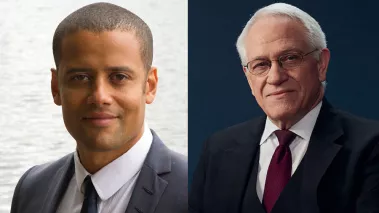
Jacob Mchangama (left) and Robert Corn-Revere (right)
In this issue of First Amendment News we highlight two important career moves, one by Robert Corn-Revere and the other by Jacob Mchangama — both noted free speech advocates.
We are also pleased to announce that, as of this date, some 3,000 people subscribe to FAN, and our readership numbers exceed that. In the months to come we hope to experiment with more innovative ways to bring our readers yet more news about free speech developments. So stay tuned! — rklc
Corn-Revere Joins FIRE team
“FIRE is serious about building the best First Amendment litigation practice in America. Bob is a world-class litigator. We couldn’t be more excited to welcome him to the team.” — Greg Lukianoff
Continuing his impressive journey as a First Amendment lawyer at Hogan and Hartson and then at Davis Wright Tremaine, Robert Corn-Revere recently joined his colleague Ronnie London (see here) as chief counsel for FIRE.
“The Foundation for Individual Rights and Expression is thrilled to announce that leading First Amendment litigator and author Robert Corn-Revere has joined the organization’s litigation department as chief counsel.”
Corn-Revere has taken on many high-profile cases throughout his storied career as a First Amendment litigator. He successfully argued United States v. Playboy Entertainment Group, Inc., in which the U.S. Supreme Court struck down part of the Telecommunications Act of 1996. He also served as co-counsel in United States v. Stevens, in which the Court held that a federal statute prohibiting depictions of animal cruelty violates the First Amendment. And he successfully defended CBS Broadcasting in the Janet Jackson “wardrobe malfunction” case arising from the 2004 Super Bowl halftime show.
“Bob has few peers in the world of First Amendment litigation,” said FIRE President and CEO Greg Lukianoff. “For decades, he’s been a powerful advocate for free speech rights not only in the court of law, but also in the court of public opinion. FIRE is serious about building the best First Amendment litigation practice in America. Bob is a world-class litigator. We couldn’t be more excited to welcome him to the team.”

In his role at FIRE, Corn-Revere will draw upon his expertise and decades of experience to bolster FIRE’s expanding litigation efforts, mentor FIRE attorneys, and bring FIRE’s defense of the First Amendment and free speech culture to new audiences. He will work out of FIRE’s Washington, D.C. office.
Corn-Revere comes to FIRE from the law firm of Davis Wright Tremaine where he was a partner for 20 years specializing in freedom of expression and communications law. Before his time at DWT, he was a partner at Hogan & Hartson and served as legal advisor and later chief counsel to Federal Communications Commission Chairman James H. Quello.
Corn-Revere is a prominent writer, thinker, and advocate on free expression issues. In 2021, Cambridge University Press published his book, “The Mind of the Censor and the Eye of the Beholder: The First Amendment and the Censor’s Dilemma,” which explores how free expression became a part of America’s identity. He also co-authored the three-volume treatise, “Modern Communication Law,” published by West Group.
- Excerpt from posthumous pardon petition in Lenny Bruce case (5/20/2003)
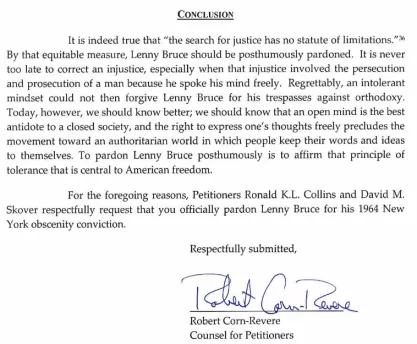
In 2003, he successfully petitioned Governor George E. Pataki to grant the first posthumous pardon in New York history to the late comedian Lenny Bruce, who was convicted for “obscene” comedy routines.
Before joining FIRE full-time, Corn-Revere was a volunteer on FIRE’s Advisory Council. He also served as outside counsel for FIRE’s Stand Up For Speech Litigation Project, successfully litigating on behalf of college students and faculty whose First Amendment rights were violated.
“I am excited to enter a new phase in my career to support FIRE’s expanded mission to protect freedom of expression not just in higher education, but in American society in general,” said Corn-Revere. “Now is a critical time in the ongoing struggle to defend the law of free speech and — perhaps more importantly — a culture that supports free expression. I am proud to join an organization known for its consistent and principled defense of these fundamental values.”
Mchangama launches base at Vanderbilt University
“I’m delighted to welcome Jacob and Justitia by announcing the opening of The Future of Free Speech project,” Vanderbilt University Chancellor Daniel Diermeier said. “Jacob’s work as a legal expert and human rights lawyer highlights the importance of promoting free speech in higher education. The Future of Free Speech project will enhance Vanderbilt’s status as a leading center for free speech, scholarship, collaboration and innovation.”
Justitia’s “The Future of Free Speech” project is expanding its global reach with the opening of an office at Vanderbilt University in Nashville, Tennessee. The project aims to foster a thriving global culture of free speech, particularly in a world where free speech is under threat in both authoritarian states and democracies, online and offline. The new collaboration with Vanderbilt University will enable the project to provide cutting-edge research, insightful analysis, and impactful advocacy to reverse the free speech recession and strengthen the most fundamental of human rights.
Jacob Mchangama, CEO of Justitia, will lead the Future of Free Speech Project and also be appointed as a research professor at Vanderbilt University's College of Arts and Sciences. Jacob has written and commented extensively on the topic in international media and has received several awards for his work. His book “Free Speech - A History from Socrates to Social Media” was published in 2022 and has been translated into several languages.
Daniel Diermeier, chancellor of Vanderbilt University, expressed his delight in welcoming Jacob and Justitia to the university, recognizing Jacob as one of the world's leading authorities on free speech. He also highlighted the importance of promoting free speech in higher education, and how the partnership with the Future of Free Speech Project will help enhance Vanderbilt's status as a leading center of free speech, scholarship, convening, and innovation.
Founded in 2014, Justitia is an independent and nonpartisan think tank based in Copenhagen, focusing on fundamental freedoms and the rule of law. Its Future of Free Speech Project has published cutting-edge research and provided influential commentary on the state of global freedom of expression, which has been featured in over 900 media outlets in more than 60 countries. As of April 1, 2023, the Future of Free Speech will expand its activities with a new office on the campus at Vanderbilt University in Nashville, TN.
SCOTUS grants review in two social media cases
Earlier this week the Supreme Court granted review in the following two cases:
- O’Connor-Ratcliff v. Garnier: The issue raised in the case is whether a public official engages in state action subject to the First Amendment by blocking an individual from the official’s personal social-media account, when the official uses the account to feature their job and communicate about job-related matters with the public, but does not do so pursuant to any governmental authority or duty. Hashim M. Mooppan is the counsel of record.
- Lindke v. Freed: The issue raised in the case is whether a public official’s social media activity can constitute state action only if the official used the account to perform a governmental duty or under the authority of his or her office. Allon Kedem is the counsel of record.
Related
- Gonzalez v. Google (argued Feb. 21): The issue raised in this case is whether Section 230(c)(1) of the Communications Decency Act immunizes interactive computer services when they make targeted recommendations of information provided by another information content provider or only limits the liability of interactive computer services when they engage in traditional editorial functions (such as deciding whether to display or withdraw) with regard to such information.
- Counterman v. Colorado: social-media “true threats” case
- Adam Liptak, “Supreme Court to Decide Whether Officials Can Block Critics on Social Media,” The New York Times (April 24)
- John Fritze, “Can officials block critics on Twitter? Supreme Court weighs if that violates First Amendment?,” USA Today (April 24)
Supreme Court hears ‘true threats’ case
The Supreme Court recently heard oral arguments in Counterman v. Colorado. The issue raised in the case is whether to establish that a statement is a “true threat” unprotected by the First Amendment, the government must show that the speaker subjectively knew or intended the threatening nature of the statement, or whether it is enough to show that an objective "reasonable person" would regard the statement as a threat of violence.
- Susanna Granieri, “Supreme Court Considers ‘True Threats’ Doctrine in Colorado SocialMedia Stalking Case,” First Amendment Watch (April 21)
- Mary Anne Franks, “Chief Justice John Roberts’ Mockery of Stalking Victims Points to a Deeper Problem,” Slate (April 21)
- Amy Howe, “Justices hear ‘true threat’ protected speech case,” SCOTUSblog (April 20)
- Amy Howe, “Colorado man’s First Amendment challenge will test the scope of protection for threatening speech,” SCOTUSblog (April 17)
- Timothy Zick, “Making True Threats Is a Crime,” The Atlantic (April 12)
How to blow up a pipeline: Testing the limits of First Amendment protection?
- Sophia Nguyen, “What’s stopping ‘How to Blow Up a Pipeline’ from telling you how?,” The Washington Post (April 25)
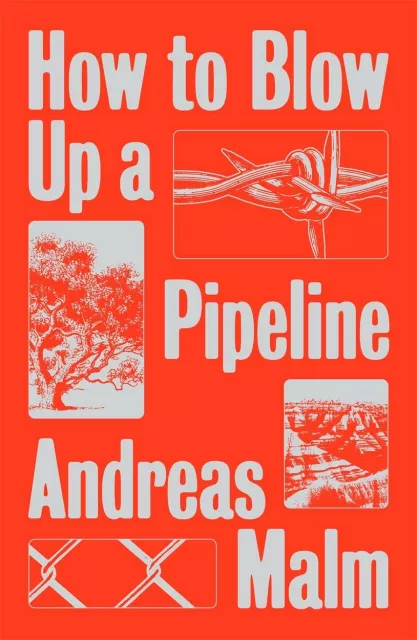
“How to Blow Up a Pipeline,” Andreas Malm’s 2021 book calling for a more radical flank of the climate movement, does not, in fact, tell you how to blow up a pipeline.
The title is “partly metaphorical,” Malm said in a recent phone interview. “The intention of the title was never to come up with any detailed instructions for how to do it. To be honest, I don’t know how to do it.”
What about the screen adaptation of Malm’s manifesto, now in wide release, also called “How to Blow Up a Pipeline”?
[ . . . ]
[I]s anything stopping . . . hypothetical book or movie from saying — not in broad strokes but directly, step by step — how to blow up a pipeline? Legal experts say that the First Amendment broadly protects speech, even speech that could or does lead to a crime, with a few carveouts.
One exception is incitement. The Supreme Court said in 1969 that there’s a difference between lawful persuasion (which is protected) and speech “intentionally directed to producing an act of imminent unlawful violence” (which isn’t).
So how do courts define ‘imminent’? ‘If there’s any cool-down time for reflection, then it’s not going to meet the imminence requirement,’ said Brian Hauss, a senior staff attorney at the American Civil Liberties Union. The textbook example of incitement is someone in front of an angry mob telling them to attack a person. But broader or more abstract advocacy, even of an illegal or violent act, doesn’t count.
Forthcoming book: Zick on the law of public protest
- Timothy Zick, “Managed Dissent: The Law of Public Protest,” Cambridge University Press (forthcoming, May 11)
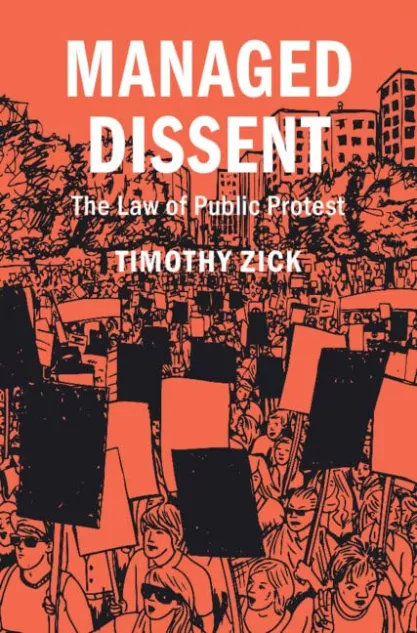
The mass street demonstrations that followed the 2020 police murder of George Floyd were perhaps the largest in American history. These events confirmed that even in a digital era, people rely on public dissent to communicate grievances, change public discourse, and stand in collective solidarity with others. However, the demonstrations also showed that the laws surrounding public protest make public contention more dangerous, more costly, and less effective. Police fired tear gas into peaceful crowds, used physical force against compliant demonstrators, imposed broad curfews, limited the places where protesters could assemble, and abused 'unlawful assembly' and other public disorder laws.
These and other pathologies epitomize a system in which public protest is tightly constrained in the name of public order. Managed Dissent argues that in order to preserve the venerable tradition of public protest in the US, we must reform several aspects of the law of public protest.
Op-ed: Comedy clubs as free speech zones
- Ronald Collins and Ronnie Marmo, “Comedy clubs are free speech zones — and the antidote to cancel culture,” Buffalo News (April 25) (originally published in Chicago Tribune)

After comedian Dave Chappelle’s show in Minneapolis was canceled for being offensive, Jamie Masada, owner of comedy club chain the Laugh Factory, told Fox News Digital that the “comic stage is their sanctuary. We have to protect the First Amendment. We can’t dilute it. We have to be able to laugh at ourselves.” Not only should that sanctuary be preserved, but it must also be enriched to exemplify the vital values of free speech zones.
George Carlin said that Lenny Bruce “prefigured the free-speech movement and helped push the culture forward into the light of open and honest expression.”
More than ever, that light needs to shine brightly, first in and then out of America’s comedy clubs — those last safe havens of free speech in a democracy. So let the free speech campaign begin in comedy clubs across the land, those free speech zones where censorship is bum-rushed out the door.
Morey and Strossen on teaching culture at Barnard College
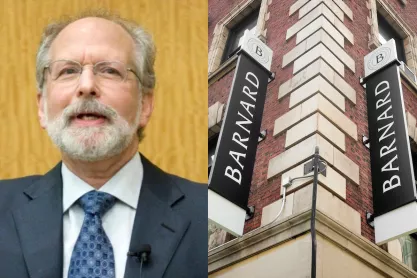
- Alex Morey and Nadine Strossen, “Who’s allowed to teach ‘Culture in America’?” FIRE (April 25)
Jonathan Rieder knows racism divides people.
He’s spent his entire scholarly career researching racial conflict and the language we use to discuss race, and he is a foremost expert on the work of Martin Luther King, Jr. For much of his 30 years teaching sociology at Manhattan’s Barnard College, Rieder’s ‘Culture in America’ course has been a staple. He invites students to unpack their own experience of American politics, privilege, and pluralism, while confronting ‘what they often find to be disturbing opinions,’ Rieder says, on some of the most volatile disagreements in American life. Christian nationalists’ anti-gay views, the racial resentment of swing-state whites, and conservative Supreme Court decisions with which Rieder personally disagrees are just a few of the hot-button topics on the syllabus.
And that’s for good reason. Rieder wants students to ask themselves, “How do I know what’s true?” while he gives them the tools to answer objectively.
Rieder says he often tells his students at the beginning of class, “I don’t care if you are a Trumpian, a black nationalist or a libertarian. All viewpoints are welcome as long as you ground your arguments in evidence and rigorous methods.”
But for almost a year, one particular viewpoint has been unwelcome in “Culture in America” — his own.
Creeley on protecting free speech with no apologies
- Will Creeley, “FREE SPEECH: If it’s protected, we'll defend it. No apologies,” FIRE (April 21)
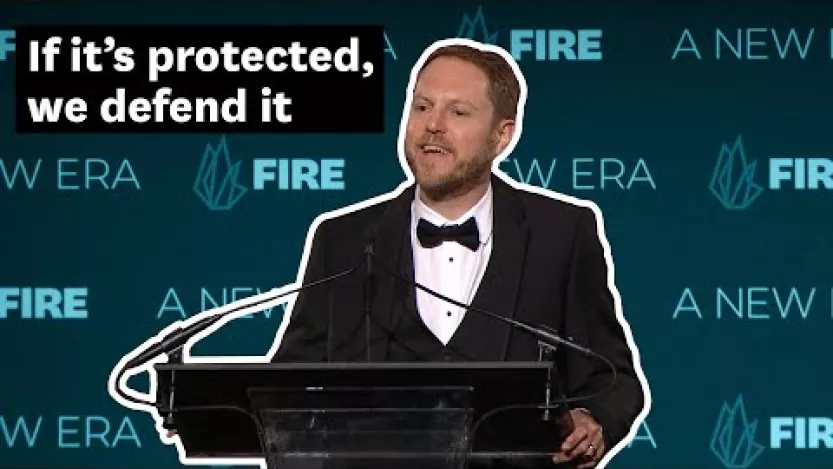
More in the news
- Eugene Volokh, “Florida Libel Reform Bills Die in Legislature,” The Volokh Conspiracy (April 25)
- Susanna Granieri, “E. Jean Carroll’s Defamation and Battery Lawsuit Against Trump Begins in Manhattan,” First Amendment Watch (April 25)
- Eugene Volokh, “Students Sue After Michigan School District Forces Them to Remove ‘Let’s Go Brandon’ Sweatshirts,” The Volokh Conspiracy (April 25)
- Eugene Volokh, “Egregious Violations of Academic Freedom at Collin College,” The Volokh Conspiracy (April 24)
- Dennis Hetzel, “Proposal on student ‘trigger warnings’ triggers veto from Cornell president,” The Free Speech Center (April 17) (see FIRE press release)
2022-2023 SCOTUS term: Free expression and related cases
- O’Connor-Ratcliff v. Garnier
- 303 Creative LLC v. Elenis (argued Dec. 5)
- Jack Daniel’s Properties, Inc. v. VIP Products LLC (argued March 22)
- United States v. Hansen (argued, March 27) (Volokh commentary here)
- Counterman v. Colorado (to be argued, April 19)
Pending petitions
- Tingley v. Ferguson
- Frese v. Formella
- National Rifle Association of America v. Vullo
- Mobilize the Message v. Bonta
- Vidal v. Elster
- U.S. v. Hernandez-Calvillo
- Price v. Garland
- Moody v. NetChoice, LLC
- NetChoice, LLC v. Moody
- Florida v. NetChoice
- Klein v. Oregon Bureau of Labor and Industries
State action
- O’Connor-Ratcliff v. Garnier (cert. granted)
- Lindke v. Freed (cert. granted)
Qualified immunity
- Novak v. City of Parma (cert. denied)
Immunity under Foreign Sovereign Immunities Act
- NSO Group Technologies Limited v. WhatsApp Inc. (cert. denied)
Liability Anti-Terrorism Act
- Twitter v. Taamneh (argued Feb. 22)
Section 230 immunity
- Gonzalez v. Google (argued Feb. 21)
Review denied
Previous FAN
FAN 376: “Settlement in Dominion v. Fox News case — facts, questions, and takeaways”
This article is part of First Amendment News, an editorially independent publication edited by Ronald K. L. Collins and hosted by FIRE as part of our mission to educate the public about First Amendment issues. The opinions expressed are those of the article's author(s) and may not reflect the opinions of FIRE or of Mr. Collins.
Recent Articles
FIRE’s award-winning Newsdesk covers the free speech news you need to stay informed.

FIRE to defend veteran pollster J. Ann Selzer in Trump lawsuit over outlier election poll

Meta’s content moderation changes closely align with FIRE recommendations

FIRE statement on legislative proposals to regulate artificial intelligence


